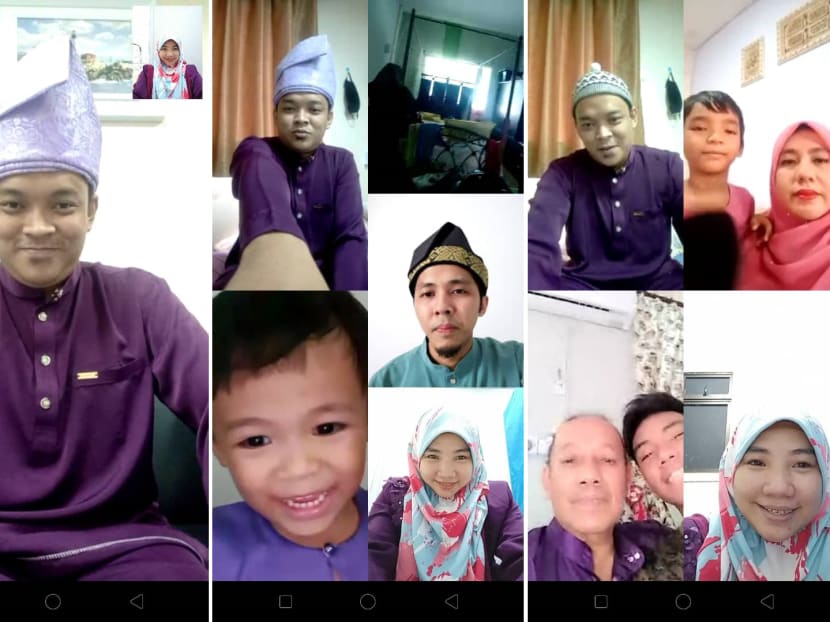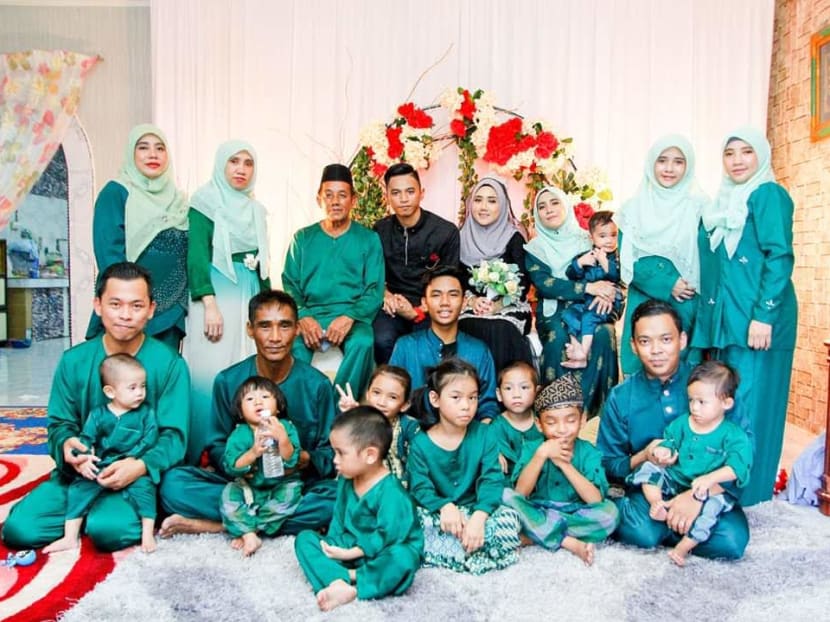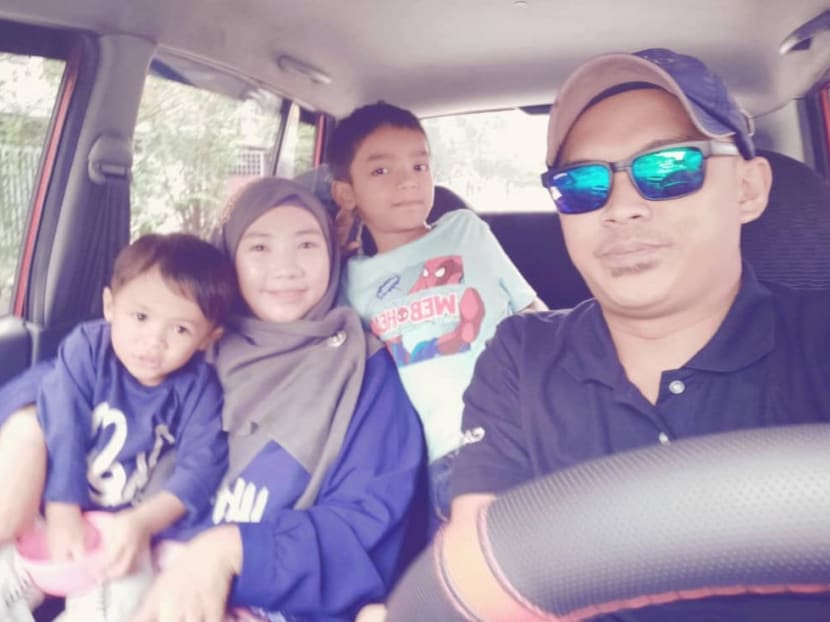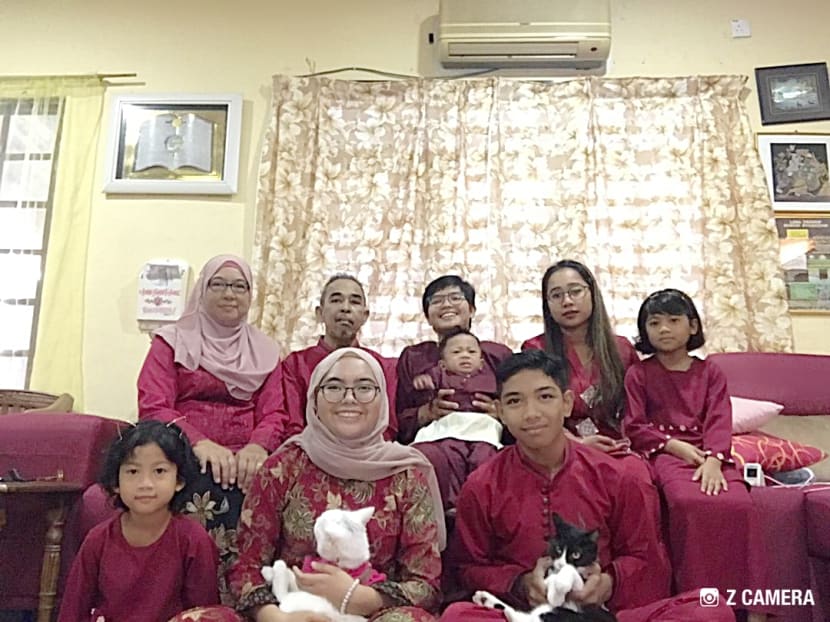Tears and heartache as Malaysians spend emotional Hari Raya Puasa in Singapore
SINGAPORE — Alone in her rented bedroom in a Housing and Development Board (HDB) flat, Ms Siti Fatimah Awang waited for a video call on Sunday (May 24) morning.

Ms Siti Fatimah Awang (bottom, far right) on a video call with her husband (far left), their two sons as well as other family members on Hari Raya Puasa on May 24, 2020.
SINGAPORE — Alone in her bedroom in a Housing and Development Board rental flat, Ms Siti Fatimah Awang, a Malaysian who works as a cleaner at a gym in Chai Chee, waited for a video call on Sunday (May 24) morning.
The morning of Hari Raya Puasa was to her, utterly unfamiliar.
Back in her kampung in Johor Baru, Malaysia, on this festive occasion, it was usually a race against time getting everything ready before her husband and the rest of the men in her family returned home from the morning prayer at the mosque.
She would run after her two sons to get them dressed before rushing to help her mother-in-law and sisters-in-law set the dining table with ketupat, rendang and an assortment of other dishes made specially for the celebrations of the day.
“The feeling was… the best,” Ms Siti Fatimah, 36, said.
This year, there was none of that. Her husband, a construction worker who also works here, is not allowed to leave a temporary isolation facility for foreign workers. Their sons, aged seven and two, are being cared for separately by her sister in Malaysia and a babysitter.
“I don’t know what it will be like. A lot of crying maybe…,” Ms Siti Fatimah had told TODAY last Friday about the precious video call she was anticipating.
On Sunday, she put on a purple baju kurung, the colour her family had chosen for this year.
“Everyone at home would be wearing purple. My husband made sure we got the clothes because since we didn’t get to go back, at least we will have this memory in our video calls that we all were dressed to match like usual,” she said.
When the family finally had the call that lasted half an hour, Ms Siti Fatimah broke down in her Bukit Merah rental flat.
“I told my husband I’d be strong but when I saw my kids, I couldn’t hide my feelings any longer,” she said.
“It was emotional. But I’m happy I got to see them, though I wish I was holding them in my arms. Knowing they are safe and spending their Hari Raya with people I trust, is all that matters.”
Ms Siti Fatimah is just one of the many Malaysians who spent Hari Raya in Singapore. Most of them are away from their families for the first time on the day, which marks the end of the holy fasting month of Ramadan.
Due to Malaysia's movement control order (MCO) that was enforced on March 18, Malaysians cannot leave the country and foreigners cannot enter.
Those who travelled daily to Singapore for work were forced to make a decision to move across the Causeway and stay here temporarily — or risk losing their jobs.

Ms Siti Fatimah and her husband were offered a bedroom in a three-room HDB flat by her employer when they made a choice to stay here.
Less than a month later, the couple were both asked to stop work when it was Singapore’s turn to restrict movement of people and halt business activities with a circuit breaker that started on April 7.
To make things worse, over a week ago, her husband had to move to an isolation facility to be tested for Covid-19 before he could resume work, so she has been alone since.
She said that she does not know how long her husband, who has now resumed work, will be required to stay there even though he has tested negative.
“Not being able to celebrate with my family is hard. And now, I’m apart from my husband, too. If he were here, at least we’d have each other’s company. I have never spent the day without them before. My kids…,” Ms Siti Fatimah’s voice trailed off, as she started to cry.
“I feel sad that I’m not with them. Every time we video-call, they always ask me when I’m going home to be with them again. Our video calls always end with all of us crying. Every time someone asks me about them, I will cry. We have never been far. I used to see them every day, but now I can’t.
“They will see how their friends are celebrating with their parents and will be affected. My heart is there… with them.”

SON IS UPSET, REFUSES TO GET NEW CLOTHES
Another Malaysian, Ms Juliana Abdul Jamak, a 40-year-old massage therapist who also moved to stay in Singapore temporarily after the MCO came into effect, told TODAY that she could not talk about being apart from her son this time of the year without crying.
Her 13-year-old son has been living with her ex-husband since their divorce nine years ago, and the only times she gets to spend with the boy are during his school holidays, Hari Raya Puasa and Hari Raya Haji.
“My parents have passed away so Hari Raya is really all about him. It’s us spending time together. We have fun with our extended family, eating and then visiting my parents' graves together,” she said while sobbing.
Her son is just as affected by her absence, Ms Juliana said, adding that he refused to buy new clothes to be worn this year.
“He has never spent Hari Raya with his father’s family. I always take him home… always. He told me that since we can’t spend the day together, there’s no point in buying new baju melayu. He just refused.
“I assured him that we will enjoy (time together) when I’m back,” Ms Juliana said, even though she is unsure when that will be.
WORRIED ABOUT FATHER WHO IS IN HOSPITAL
Facing another unknown is Ms Siti Nur Rahimah Hamdan, who has been working in the hygiene services industry in Singapore for three years.
The 32-year-old is not sure how long her ailing father’s health will hold up after he was hospitalised on April 15 due to complications with his kidneys and diabetes.
She asked her employer if she could return home to Johor Baru to spend Hari Raya with him, but was told that she would need approval from the Ministry of Manpower here to return after her trip.
“This is the longest my father has ever been hospitalised and I’m worried. But if I were to go home, I would have to be quarantined for 14 days and there’s no guarantee I will be allowed back in Singapore,” she said.
“I can only pray that he will get better. I pray I will not have any regrets,” Ms Siti said. She is the only one of her six siblings who is working in Singapore.
“I ask my mother every day if I should return home but she is afraid I will lose my job. We need the money.”

Her family will be spending Hari Raya in the hospital by her father’s side.
“This year’s Hari Raya feels so empty,” Ms Siti said. “No excitement of buying new clothes, cooking and there will not be any family pictures.
“If I were back home, I would be spending the day at the hospital but at least I’d be with my family. And to me, that’s what Hari Raya is about.
“Here, I’m all alone and can only video-call them to make sure everyone is fine.”
GIVING SOME COMFORT THROUGH FOOD
On Sunday, Ms Siti Fatimah had something else to look forward to after her video call with her family — a packet of free nasi biryani.
To help some of these Malaysians who are missing home, retiree Mohd Razib Ibrahim, 55, gave out 1,200 packets of food on the eve of Hari Raya that included typical dishes enjoyed on the day such as ketupat and rendang, as well as 1,000 packets of nasi biryani on the day itself.
He and the other volunteers, who are used to giving out food on the weekends to underprivileged Singaporeans, have been providing free dinner to these workers, including Ms Siti Fatimah, since the MCO began.
“I am really grateful for what Mr Razib is doing,” she said.
“The sharing of these Raya dishes gives us a sense of family, even though we might not have one here. It’s something to look forward to during dark times.”
Some of the Malaysian workers in Singapore have been approaching Mr Razib for help while others knew of the volunteer team through word of mouth.
There were 16 recipients getting free meals at the start but it is now 500. The food is bought with money from donors and some meals are donated by food stalls.
“It’s too expensive for the workers to buy food here, and most of them resorted to sharing bread, biscuits and instant noodles. At times, a packet of instant noodles are being shared by two to three people,” Mr Razib said.
“For them, not being able to spend the day with their families is a very emotional thing. So what we can do to cheer them up is to give them some familiar food to maybe create a bit of Hari Raya atmosphere.”








